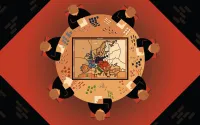Geopolitical shifts are analogous to the movement of tectonic plates on the earth. Tectonic plates move beneath the visible surface. They move continuously. The plates both converge and diverge. At certain points the pressure of converging plates or the fissures between diverging plates lead to an explosion we call an earthquake. In the geopolitical arena, analogously, we note the explosions resulting from convergence in the outbreak of "world wars." World wars cannot be missed but we are less likely to notice the divergence phenomena, which lead to lasting reconfigurations of the geopolitical arrangements, what in geological terms would be the creation of new separate continents.
The geopolitical world had a major convergence/world war from 1914 to 1945 between Germany and the United States, out of which emerged a new world order that resulted from the hegemony of the United States in the world-system. This new world order had a major fault line defined by the Cold War, but the two plates of this world order never converged. There never was a hot war between the two adversaries. On the other hand, at the same time, there were divergent tendencies. The one the United States always feared most was the possibility of Europe pulling away from the North Atlantic alliance, and then leading to a Paris-Berlin-Moscow alignment.
There were many small movements in this direction. The idea of a Paris-Moscow link was suggested in various ways by Charles De Gaulle, who saw this as a mode of restoring France's and Europe's centrality to the world-system. But the Franco-Soviet treaty he signed in 1944 was submerged by the strength of the Cold War alignments, and it must be said also because of the strength of the French Communist Party at that time, an element that De Gaulle worried about and felt he had to work to constrain. The United States and the Christian Democrats in Germany worked hard to prevent the realization of a reunited and "neutral" Germany, which might have been the forerunner to a second Rapallo Treaty between Germany and the Soviet Union. But the possibility was suggested again by the so-called Ostpolitik of Willi Brandt, which the United States opposed quite strongly. And when Gorbachev came to power in the Soviet Union, he offered the vision of the "common house" of Europe, an idea that was subsequently dropped when Yeltsin ousted Gorbachev.
The fact is that all these attempts to move in the direction of a Paris-Berlin-Moscow axis were not only opposed by the United States but opposed successfully, primarily by the brandishing by the United States of the ideological fissure of the Cold War. This argument however was something that became more difficult to make after the dissolution of the Soviet Union, and the collapse of the Communisms in east-central Europe. The underlying geopolitical plates were now slowly but definitely moving in a divergent direction. What happened after 2001 is that George W. Bush, in his failed attempts to intimidate western Europe and Russia, accomplished the remarkable feat of speeding up the divergence between Europe and the United States to a point where a major fissure is in the process of being consolidated. We shall recognize how permanent this is perhaps only a decade from now. But, when the historians of 2025 look back at this period, they will mark this realignment as Bush's great geopolitical legacy, the one transformation that will be credited directly to the activities of his administration.
The question, of course, is what difference this will make for the ongoing life of the world-system. This anchoring of Europe as a political actor quite separate from the United States will combine with the toppling of the dollar from its role as the only reserve currency, each reinforcing the other. The United States will emerge from this much weakened, not merely in real strength but in perceived strength, including perceived military strength. And then we shall all find ourselves in another ball game.
There will be three geopolitical stories to watch. One will be the economic competition between Europe and East Asia for the central role in the accumulation of capital in the coming decades. The degree of political cohesion that Europe and East Asia will each achieve separately will have a major impact on the outcome of this competition. The second will be the struggle of what might be called some middle economic powers that are also regional giants - India, Brazil, South Africa, at least - to maintain their balance and assert their role (and alliances) in this new geopolitical arena. The third is to see how the United States will be able to adjust to these new realities in which its real and perceived role will be much less than it is now.
If one is to observe this realignment and its effects soberly and intelligently, it is crucial not to analyze the daily, weekly, even yearly shifts in political positioning by the states. These will go up and down with some volatility, just as the stock market goes up and down all the time. What matters are the longer-run trends. Furthermore, it is important to take public stances of leading figures with a pinch of salt. All politicians have to talk to multiple audiences, and all engage in disinformation tactics. It is less what they say (although sometimes the public rhetoric is very revealing), or what they promise to do, but what they really do.
In any case, within the overall framework of the declining power of the United States, there is more immediately the declining significance of what George W. Bush himself says and does. He is past the pinnacle of his internal political strength, and will soon be reaping the full reward of the geopolitical setbacks the United States will be facing. He will be blamed more perhaps than is just analytically. But others will think he will only be getting his just deserts






